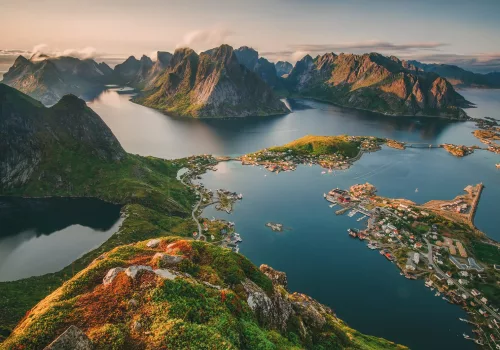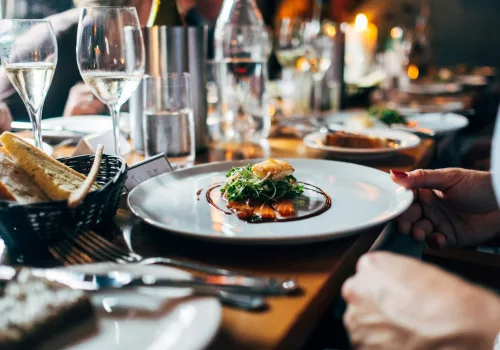Backpacking through the Balkans can be an incredible adventure filled with stunning landscapes, rich history, and vibrant cultures. To make the most of your journey, it is essential to follow some best practices that will enhance your experience and ensure a smooth trip.
Research Your Destinations
Before embarking on your backpacking trip, take the time to thoroughly research each destination you plan to visit in the Balkans. Understand the local customs, languages, and cultural norms of each country to show respect and appreciation for the local communities. Researching your destinations will also help you better appreciate the historical significance of the landmarks and attractions you visit.
Dive into History
The Balkans is a region rich with history. From the Ottoman Empire’s influence in Bosnia and Herzegovina to the ancient ruins in Macedonia, the stories behind these places can significantly enrich your experience. For instance, visiting the historic city of Mostar allows you to see the iconic Stari Most bridge, a symbol of cultural reconciliation and historical resilience.
Learn Basic Phrases
While English is widely understood in many parts, learning a few basic phrases in the local languages can go a long way. Simple greetings or expressions of gratitude in Serbian, Croatian, or Albanian can foster goodwill and open doors to deeper connections with locals.
Pack Light and Smart
When backpacking through the Balkans, it is crucial to pack light and only bring the essentials. Opt for versatile clothing items that can be layered for varying weather conditions. Additionally, consider investing in a quality backpack that is comfortable to carry for long periods. Packing smart also means including items like a reusable water bottle, portable charger, and necessary medications to ensure you are prepared for any situation.
Clothing Tips
The Balkans can experience a range of weather conditions, from the coastal warmth of Croatia to the cooler climates in the mountainous areas of Montenegro. Pack a lightweight rain jacket and a warm fleece that can be layered. Choose clothes that dry quickly and can be mixed and matched to create different outfits.
Essential Gear
Invest in a durable, water-resistant backpack with good support to ease long treks. A first-aid kit, a flashlight, and a travel lock are also advisable. If you’re hiking, a compact pair of trekking poles can be invaluable.
Stay in Hostels and Guesthouses
One of the best ways to immerse yourself in the local culture of the Balkans is by staying in hostels and guesthouses. Not only are these accommodations budget-friendly, but they also provide opportunities to meet other travelers and locals, gaining insider tips and insights. Staying in hostels and guesthouses can also lead to unique cultural exchanges and friendships that enhance your travel experience.
Choosing Accommodations
Look for accommodations with good reviews on platforms like Hostelworld or Airbnb. In smaller towns, consider family-run guesthouses where hosts often offer homemade meals and local stories. In Sarajevo, for example, staying in a traditional Bosnian house (or ‘kuca’) can provide a cozy and authentic experience.
Use Public Transportation
Utilizing public transportation is a convenient and cost-effective way to navigate through the Balkans. Trains, buses, and ferries connect major cities and towns, offering a scenic and efficient mode of travel for backpackers. Public transportation also allows you to interact with locals and observe everyday life in different regions, adding depth to your travel experience.
Navigating the Network
While buses are the most common form of transport, some countries offer reliable train services. The train journey from Belgrade to Bar is particularly scenic, taking you through the Dinaric Alps. For coastal travel, ferries connect the Adriatic islands to the mainland.
Ticket Tips
Purchase tickets in advance for popular routes to secure a seat, especially during peak tourist seasons. Many countries offer discount cards for travelers and students, so carrying an international student ID can help save money.
Respect the Environment and Communities
As a responsible backpacker, it is crucial to respect the environment and local communities in the Balkans. Practice sustainable tourism by disposing of waste properly, supporting local businesses, and minimizing your ecological footprint during your travels. You can also engage in eco-friendly activities such as hiking, cycling, or volunteering to give back to the places you visit.
Sustainable Practices
Carry a cloth bag for shopping and avoid single-use plastics. Participate in community clean-up drives if you come across one. In Croatia, for instance, many coastal towns organize beach cleaning events that you can join.
Supporting Local Economies
Choose to eat at local restaurants rather than international chains, and buy souvenirs from artisans. In Skopje, Macedonia, the Old Bazaar offers a chance to purchase handmade goods while supporting local craftsmen.
Stay Safe and Informed
Prioritize your safety by staying informed about current events and potential risks in the Balkan countries you are visiting. Keep your belongings secure, avoid risky areas, and trust your instincts if a situation feels unsafe. It is also advisable to keep copies of important documents like your passport and travel insurance information in case of emergencies.
Safety Precautions
Always lock your backpack and use hostel lockers for valuables. Be cautious when using public Wi-Fi; a VPN can help secure your online activities. Emergency numbers differ by country, so keep a list handy.
Medical Preparedness
Healthcare varies across the region. While some areas have excellent facilities, others may not. Travel insurance is crucial, covering not only medical emergencies but also travel disruptions or lost belongings.
Connect with Locals
One of the most rewarding aspects of backpacking through the Balkans is the opportunity to connect with locals and learn from their perspectives. Engage in conversations, try local cuisine, and participate in cultural activities to enhance your cultural experience. By interacting with locals, you can gain a deeper understanding of the region’s traditions, lifestyle, and values.
Engaging Activities
Attend a local festival or event. The Guca Trumpet Festival in Serbia is a vibrant celebration of music and culture. Cooking classes in Albania or wine tasting tours in Slovenia offer delicious insights into local traditions.
Language and Culture
Participate in language exchange meet-ups or workshops. Sites like Meetup or Couchsurfing often have events where you can practice language skills and meet local people eager to share their culture.
Embrace Spontaneity
While it is essential to plan and prepare for your backpacking journey, also allow room for spontaneity and unexpected adventures. Be open to serendipitous encounters, off-the-beaten-path discoveries, and unique experiences that make travel memorable. Embracing spontaneity can lead to memorable stories and experiences that you wouldn’t have encountered otherwise, adding a sense of excitement and wonder to your Balkan backpacking trip.
Off the Beaten Path
Consider exploring lesser-known destinations like the Tara River Canyon in Montenegro, a stunning yet less-touristed natural wonder. Or, visit the quaint village of Vevčani in Macedonia, known for its quirky architecture and vibrant carnival.
Unplanned Adventures
Sometimes the best experiences are unplanned. A missed bus might lead to a day exploring an unexpected town, or a chance encounter could result in an invitation to a family dinner. Embrace these moments—they are often the highlights of travel.
Navigating Borders and Visas
Traveling through the Balkans involves crossing multiple international borders. Each country has its own entry requirements, so it’s crucial to be informed about visa needs and border crossing regulations.
Visa Requirements
Check the visa requirements for each Balkan country you plan to visit. While many countries offer visa-free travel for short stays, some may require visas depending on your nationality. Sites like iVisa or the official government websites provide up-to-date information.
Border Crossings
Prepare for varying wait times at borders, especially during peak periods. Having snacks, water, and a good book can help pass the time. Remember that border officials may ask about your travel plans, so have your itinerary handy.
Budgeting Your Trip
Traveling on a budget in the Balkans is entirely feasible with some planning. Costs vary significantly between countries, so budgeting can ensure a comfortable and enjoyable trip.
Cost-effective Travel
Countries like Serbia and Macedonia tend to be more budget-friendly than Croatia or Slovenia. Hostels, street food, and public transport are all affordable, allowing you to stretch your budget further. Apps like Trail Wallet or TravelSpend can help you keep track of your expenses.
Money Matters
While credit cards are accepted in many places, carrying some cash is advisable, especially in rural areas. ATMs are widely available, but ensure your bank card is compatible with international withdrawals to avoid fees.
Cultural Etiquette
Understanding and respecting cultural etiquette is key to a positive travel experience in the Balkans. Each country within the region has its own set of customs and traditions.
Social Norms
In many Balkan countries, hospitality is a significant part of the culture, and refusing an offer of food or drink can be seen as impolite. In Albania, for example, nodding your head can mean ‘no,’ while shaking it can mean ‘yes’—a unique cultural quirk to be aware of.
Dress Codes
When visiting religious sites, dress modestly. Carry a scarf or shawl to cover your shoulders, and avoid wearing shorts. This shows respect and allows you to enter places like the monasteries of Meteora in Greece.
Food and Drink
The Balkans offer a rich tapestry of culinary delights influenced by various cultures and histories. From hearty stews to sweet pastries, the food scene is both diverse and delicious.
Must-Try Dishes
Don’t miss trying ćevapi in Bosnia, a delightful grilled dish of minced meat, or burek, a flaky pastry filled with meat, cheese, or spinach. In Croatia, taste the seafood along the Dalmatian coast, while in Bulgaria, indulge in banitsa, a traditional pastry.
Local Beverages
Enjoy local wines in Kosovo or rakija, a potent fruit brandy popular across the region. Many countries have unique versions, each worth a try. Remember to drink responsibly and savor the flavors.
Conclusion
Backpacking through the Balkans offers a unique blend of adventure, culture, and history. By following these best practices, you can ensure a fulfilling and memorable journey through one of Europe’s most captivating regions. Embrace the diversity, engage with the locals, and enjoy the spontaneous adventures that come your way. Happy travels!



